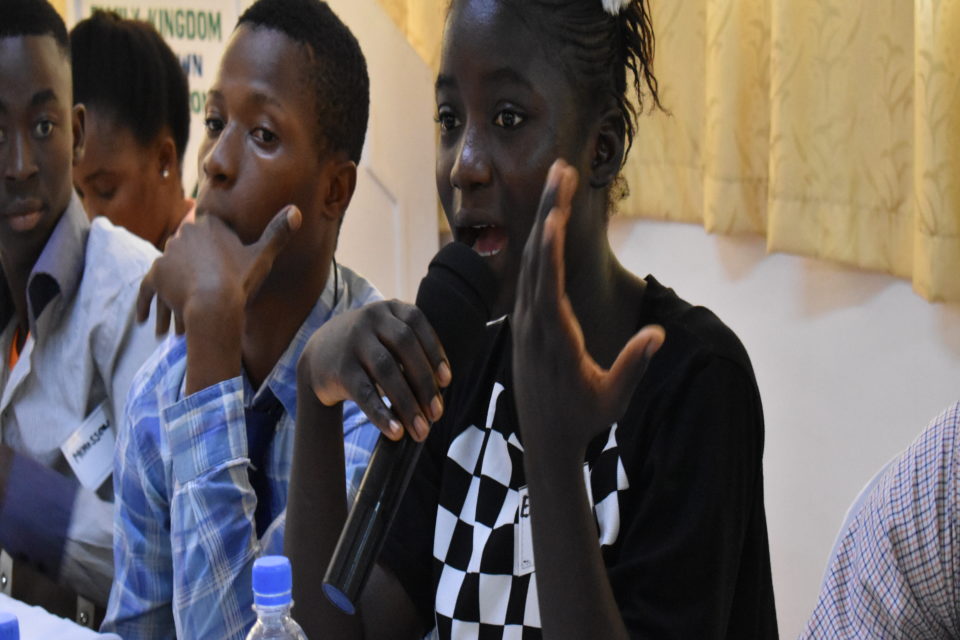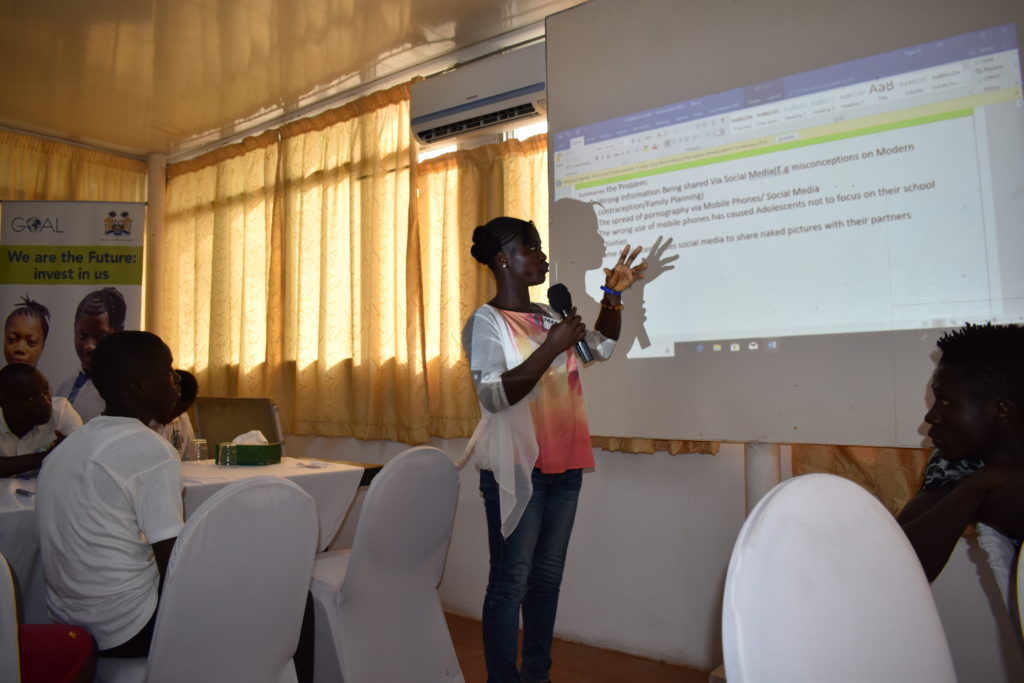 Stories
Stories
April 6, 2019 • 4 min read
There were many things which impressed me about this event but undoubtedly it was the young boys and girls who communicated their views and insights so eloquently, that really made me hopeful for the future of the next generation.

"Marie Hallissey, GOAL’s Global Health Advisor has worked on health issues in countries like Sierra Leone, Uganda and Ethiopia. Here she gives her account of the issues facing young people in Sierra Leone and highlights what GOAL and our partners are doing to alleviate the barriers facing youth in Sierra Leone today."
Adolescent youth having their voices heard at the Hackathon event in Sierra Leone.Adolescent youth sit engaged during a presentation exploring the negative influence that mobile phones and social media can have regarding surveillance and control within relationships.
Did you know that Sierra Leone is one of the most dangerous places in the world to be pregnant and give birth? At present out of 100,000 live births, 1,165 mothers die, indicating a maternal mortality rate +145 times higher than Ireland. The ambitious UN Sustainable Development Goal 3 aims to reduce the global maternal mortality ratio to less than 70 deaths per 100,000 live births by 2030. Taking these figures into account, it is clear that Sierra Leone has a long way to go. A vast 20% of maternal deaths are comprised of girls under the age of 18 (some as young as 12). Sierra Leone also has one of the highest rates of adolescent pregnancy in the world, where over 30% of girls give birth before reaching 18 years of age.
Adolescent pregnancies undoubtedly have grave health implications for both young mothers and their infants. These unplanned pregnancies interrupt and sometimes completely force girls out of education, thereby limiting their educational and economic potential. This lack of access to education, and barriers towards economic development thus perpetuate a cycle of poverty that is difficult to break. High levels of adolescent pregnancy in Sierra Leone are influenced by a range of complex social, behavioural and economic factors. These include a poorly funded health system, where public facilities often struggle to deliver supplies despite government commitments to make them available for free, high rates of sexual violence and exploitation of girls can occur as well, as limited sexual health education. There is peer pressure alongside girl’s facing a dependence on men for economic support. In addition, a culture of child marriage and patriarchal norms contribute to limited decision making power of girls.
GOAL has been working in Sierra Leone since 1998. Our Health experts work closely with the Ministry of Health and other partners to address issues of adolescent pregnancy and related maternal illness and death. GOAL supports health facilities to improve adolescent sexual & reproductive health (ASRH) services for young people and works with adolescents and communities to understand and address the key issues which contribute to the teenage pregnancy.
HACKING FOR THEIR LIVES
With funding from the Bill and Melinda Gates Foundation, GOAL conducted research in 2018 on Adolescents’ Perspectives on Adolescent Pregnancy and Contraceptive Use and specifically looked at the role of mobile phones and social media on the information they received and the choices they made. I joined our team in Freetown when the results of this research were presented to adolescents and a wide range of stakeholders from across the public and private sector working in Sierra Leone to build upon our research and come up with dynamic solutions.
The ultimate aim of this event was to gather key stakeholders in one room to ‘hack’ their ideas and experiences to find innovative solutions to deep-rooted problems. For our ASRH Hackathon we invited local and international, public and private-sector experts, together with adolescents to brainstorm and develop innovative solutions and approaches to increase contraceptive use among adolescent girls and boys. Including adolescents in the process ensured critical insights and exploration of barriers to contraceptive use in a context of a changing communication landscape.
Over three days, we discussed two broad themes – one around the positive and negative potential of mobile phones and technology – discussing their potential to deliver trustworthy health-related educational content, to improve service provision and how to limit the negative potential of phones and social media for surveillance and control within relationships. The second theme related to behaviour change – with discussions on taking responsibility in adolescence; shared decision-making within relationships and gender power dynamics with regards to contraception.
There were many things which impressed me about this event but undoubtedly it was the young boys and girls who communicated their views and insights so eloquently, that really made me hopeful for the future of the next generation. Despite coming from some of the poorest urban slums of Freetown they stood up and clearly explained the many challenges in their lives and how they saw a way forward. Hearing the interesting work that other organisations are also doing in Sierra Leone to improve the lives of young people was also inspiring and we explored ways we could all work together for bigger impact and to help achieve the objectives of the Sierra Leone National Strategy for the Reduction of Adolescent Pregnancy and Child Marriage (2017-2021).

